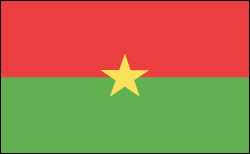- / Countries of the World
- / history
Burkina Faso History

Index
- Burkina Faso Profile
- History
President Compaoré Is Deposed
In October 2014, President Compaoré, who served as president for 27 years, attempted to push a bill through parliament to allow him to serve another term. Violent protests broke out in the capital, and demonstrators set the parliament building on fire. Compaoré stepped down on October 31 and fled to nearby Ivory Coast. Gen. Honoré Nabéré Traoré claimed to be head of state and deployed troops into the streets. However, Lt. Col. Isaac Zida, the No. 2 figure in the presidential guard, resisted Traoré, and won the support of other commanders and became head of state. The African Union told the military leaders that if they did not cede power to civilians then sanctions would be imposed on the country.
In November, a panel of religious, military, political, and traditional leaders named Michel Kafando, a longtime diplomat, interim president. An agreement called for Kafando to oversee preparations for elections in late 2015. He will remain in office until elections are held. Kafando appointed Zida as prime minister—a move that prompted some to speculate that the military would control the transition to democracy. The U.S. has fostered ties with Burkina Faso in recent years in its fight against Islamic insurgents in West Africa and maintains a base there from which it launches reconnaissance flights into the region. In fact, Zida has been trained by U.S. troops.
On Nov. 29, 2015, opposition party leader Roch Marc Christian Kaboré won the presidential election in the first round of voting. Kaboré received 53.5% of the vote. Second place candidate Zephirin Diabré received 29.7%. Kaboré previously served as Burkina Faso's prime minister from 1994 through 1996, and as president of the National Assembly from 2002 until 2012. In Jan. 2014, he left the ruling Congress for Democracy and Progress party to found a new opposition party, the People's Movement for Progress. Kaboré took office in December. The following month, Paul Kaba Thieba was named prime minister. Thieba announced his government on Jan. 13, 2016.
See also Encyclopedia: Burkina Faso .
U.S. State Dept. Country Notes: Burkina Faso
